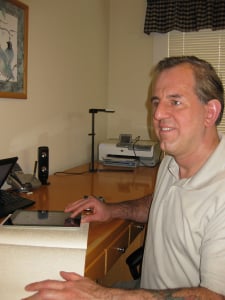When an editor at NBP approached me last year to write a book about iPad accessibility for parents and teachers, I jumped at the chance. After all, I have been doing iPad training for years. How hard would it be to put it into words? Little did I know how wrong my initial assessment would be, and what an incredible learning experience it would become, both professionally and for me personally.
1. Stick to a Schedule
I run a small business where I basically operate under the principle of “The one who yells the loudest” gets my attention. It took my ordinarily mild-mannered editor at NBP to literally threaten me with David Ortiz’s bat to get me to stick to a publishing schedule. And I quote: If Chapter 1 is not submitted by noon on Friday, the ball game is over. The same went for the rest of the chapters. Once I got into the swing of things, I was able to build up the momentum it took to actually write a book.
2. Editing Hurts
My wolf-in-sheep’s-clothing editor made me commit, in writing, to “work with her through any number of edits until the book was right.” By doing so, I set in motion one of the most painful four months of my life. I had no clue that an author had to be involved in clarifying, restating, and regurgitating every section of the book over and over and over. All kidding aside, though, I see now that the final edited version is far superior to the “completed manuscript” I originally submitted—what I now refer to, affectionately, as my “very rough draft.”
3. The Author Doesn’t Know Everything
This was yet another truth that was nearly impossible for me to grasp! During the editing process, my lion-tamer editor got the idea that she could ask other professionals for their opinions—I mean, she actually dared to question the author! But then a funny thing happened: I was tamed. I learned that by involving others and considering their opinions, I could take a more objective panoramic view of what we were trying to accomplish.
4. Book Reviewers Have Opinions, Too
By the time the final copy went out to a team of reviewers, I thought the worst was over. Early reviews were very positive; I felt vindicated. But then minor suggestions cropped up, followed by major adjustments, including a series of “YIKES!,” with yet further revisions. It felt like a “shark feeding.” Gradually, though, I began to see that the reviewers re-shaped this book into something far more inclusive than I could have done alone.
I can’t really describe the overwhelming sense of pride and completeness that came over me when I was informed the book was truly finished and off to the printer. Perhaps these feelings were accentuated by the realities of so many months of really hard work to get this book “right.” And one more thing I’m absolutely certain of: By the time you read this copy, it will no longer be a rough draft.

